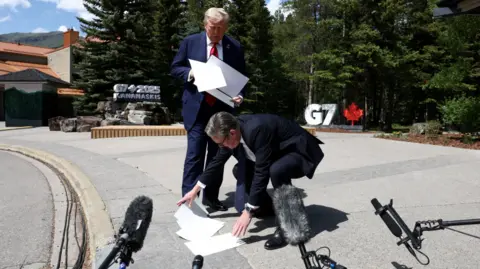On June 17, 2025, UK Prime Minister Sir Keir Starmer found himself in an unexpectedly humorous situation during the G7 Summit in Kananaskis, Canada. While discussing the details of a newly signed UK-US trade agreement, he rushed to help US President Donald Trump retrieve documents that had spilled onto the floor. This moment quickly became a talking point for the media, not just for the act of assistance but also for the underlying implications concerning security protocols surrounding the U.S. President.
Starmer recounted that his decision to pick up the fallen papers was partly influenced by a concern regarding the potential reactions of the White House security team. “There are quite strict rules about who can get close to the president,” he observed. He made a light-hearted remark to the gathered reporters, noting that if anyone else had attempted to approach Trump to assist, it could have created an uncomfortable situation. His acknowledgement that “not that any of you rushed to!” added an element of levity to the occasion, highlighting the often rigid nature of political interactions.
This incident unfolded as Starmer and Trump engaged with media representatives about the significant implications of the recently established trade deal. Starmer emphasized the importance of this agreement for the UK, particularly benefiting tens of thousands of workers associated with Jaguar Land Rover (JLR). He articulated the relief felt by the workforce, citing direct communications with JLR’s CEO, who reiterated the stakes involved in securing the deal and the consequent safeguarding of jobs.
The trade arrangement aims to eliminate tariffs on the aerospace sector and reduce import taxes on UK-made cars sent to the U.S. from 25% to 10%. The significance of this arrangement extends beyond mere numbers; it represents a lifeline for industries heavily reliant on the U.S. market. However, broader discussions surrounding specific tariffs remain unsettled, with ongoing negotiations aimed at addressing the crucial steel import charges.
While the deal has received approval from key figures in both nations, including President Trump, who praised Starmer for his commitment and success in securing the pact, it has also faced critique. Some opposition parties in the UK, particularly the Conservative Party under the leadership of Kemi Badenoch, have dismissed it as a “tiny tariff deal” lacking in substance.
Starmer expressed optimism about the partnership strengthening UK-US relations and fostering job security. The deal, he asserted, marked a “very important day” for both countries, echoing sentiments shared on the international stage during the summit. The convergence of leaders seeking to address various global issues underscored the importance of such agreements in the broader context of geopolitical stability and economic interdependence.
Moreover, Trump’s trade policies have provoked concern, particularly regarding the impulse to impose rapid tariffs on a variety of imports. This trend sparks apprehension among UK manufacturers, given that a significant segment of their outputs is directed toward the U.S. market. Both countries must navigate these complex waters as they establish beneficial trade conditions while sustaining their respective economic interests.
In summary, the playful moment between Starmer and Trump has become emblematic of a larger narrative regarding the relationship between the UK and the U.S. The meeting not only reaffirmed commitments to mutual trade but also highlighted the interpersonal dynamics at play among world leaders. This incident serves not just as a glimpse into the lighter side of diplomacy but also as a poignant reminder of the vital stakes involved in international relations.



